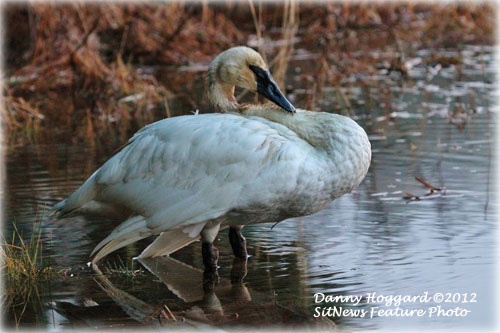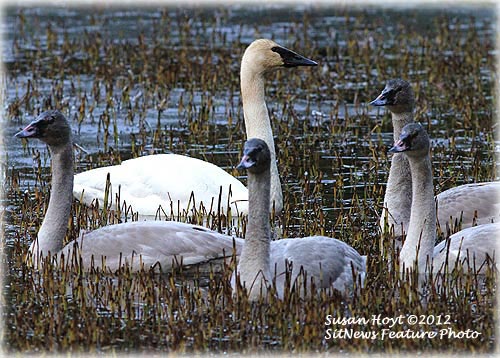
Mysterious Deaths of Trumpter Swans Under InvestigationBy MARY KAUFFMAN
December 17, 2012
Following up reports about the Trumpeter Swans from community members, Erin Uloth a spokesperson for the United States Forest Service, told SitNews Monday afternoon that an investigation is in progress and that Trumpeter Swans are protected by the Migratory Bird Treaty Act.
In this recent photograph dated Dec. 15, 2012, this adult Trumpeter Swan appears to be suffering from a neck injury.
Uloth said if anyone has information to report concerning this investigation, the Forest Service would appreciate a call to their local law enforcement officer. This is an ongoing investigation and we would welcome more information said Uloth. Information and/or reports should be made to Forest Service Officer Bryan Scaggs at 228-6235, said Uloth. Ketchikan resident Steve Hoffman told SitNews he had discovered two dead Trumpeter Swans approximately a month ago in the Ward Lake area during an outing. Hoffman said from his observations, the two Trumpeter Swans appeared to have been shot. Hoffman said he followed up by reporting the dead swans to the Forest Service. Hoffman said the Trumpeter Swans like to stay in the lake area closest to the access road which would make them easily vulnerable if someone did shoot at them. Hoffman, recently retired, previously worked for the Alaska Department of Fish and Game.
Ward Lake: There were two adult Trumpeter Swans and four juveniles in this flock at the time of this photograph - Dec. 05, 2012.
Lewis said he would like these beautiful birds protected and very interested in finding out what might be happening to them. He said he attempted to make a report to the Alaska State Troopers after observing the injured swan last week and was told by the dispatch/receptionist that the Troopers didn't take such reports. Lewis said he later spoke with a Forest Service law enforcement officer about the injured swan. In a discussion on FaceBook, others had the opinion that the injured swan may have been harmed by an unleashed dog. Dogs have been observed in the area without leashes and have previously been observed chasing the swans. When walking dogs, individuals should be aware the leash law is in effect in the Ward Lake Nature Trail area. Mink, a carnivorous animal, have also been observed in the area. The mink kills vertebrate prey by biting the back of the head or neck, leaving canine puncture marks. However, mink tend to prey on cygnets, the offspring, of the Trumpeter Swan. The Migratory Bird Treaty Act (MBTA), which protects the Trumpeter Swans, is a criminal statute and a “knowing” violation of the act is a felony. The Migratory Bird Treaty Act now protects nearly all native birds in the United States. Unlike the Endangered Species Act, the Migratory Bird Treaty Act is relatively unknown to the general public and thus causes little controversy. Many people may not know that the Migratory Bird Treaty Act also makes it illegal to disturb the nest of any native bird without a permit. Despite the title, the Act also protects birds that are not considered "migratory" (like Chickadees). Before this law was passed, hunting of non-game birds was basically unregulated. In the 19th and early 20th centuries, the Trumpeter Swan was hunted heavily, both as game and a source of feathers. The trumpeter was rare or extinct in most of the United States by the early twentieth century; however, many thousands survived in the core range in Canada and Alaska. With protection, populations have since rebounded. The Migratory Bird Treaty Act (“MBTA”), 16 U.S.C. § 701-12, was first enacted in 1918 and was a part of the first generation of federal wildlife laws. Again, information and any injury observations about migratory birds should be reported to Forest Service Law Enforcement Officer Bryan Scaggs at 228-6235.
E-mail your news &
photos to editor@sitnews.us
|
||

